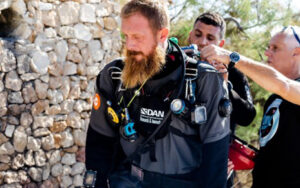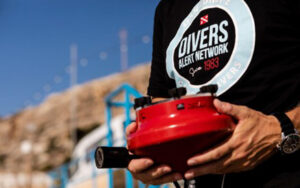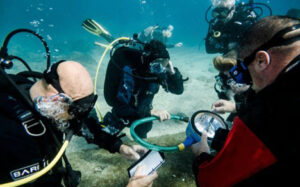Arkadiusz Srebnik, a diving instructor from Poland working in Malta, has used DAN Europe’s programmes to contribute to marine conservation through citizen science. In this interview, he shares his journey into diving and conservation, his experiences with DAN Europe’s training, and the significance of projects like MPA4Change.
A Passion for Diving and Marine Conservation

Arkadiusz Srebnik participating in data collection with DAN Europe – Photo by Arkadiusz Srebnik @polanddivingphoto
Arkadiusz’s diving journey began in the cold waters of Poland, where he immediately became involved in underwater clean-up efforts. “As soon as I started diving, I took part in one of the big underwater cleanups in my town,” Arkadiusz recalls. “I knew right away that protecting the underwater world was something that had to be done. It was the same world that fascinated me as a child, watching the adventures of Cousteau’s crew on TV.”
After relocating to Malta, Arkadiusz discovered DAN Europe’s Bachelor programme and quickly realized that it was the perfect opportunity to deepen his diving education and earn a degree in something he loved. His engagement with DAN Europe and its research initiatives became a key part of his commitment to promoting marine protection and sustainability within the diving community.
Citizen Science and MPA4Change
One of Arkadiusz’s key contributions has been his involvement in citizen science, which DAN Europe has been at the forefront of through its training programmes. “On the Bachelor program, we had multiple lectures covering various aspects of citizen science, from gathering diving data to marine protection data,” he explains. “The importance of every diver’s participation in filling knowledge gaps became clear to me. Small tasks, multiplied by a large number of participants, can have a significant impact on the world.”
Through this training, Arkadiusz has learned how to collect data efficiently, contributing to marine conservation efforts both locally and globally. For him, the most memorable aspect of his training has been the ease with which divers can engage in citizen science, regardless of location. “Every dive is now an opportunity to make a change and help researchers around the Mediterranean and the world. It can be applied anywhere—from a small ‘house’ reef in front of a diving center to a prestigious MPA,” he adds.
The Importance of Marine Protected Areas

Floating buoy to collect diving data while underwater – Photo by Arkadiusz Srebnik @polanddivingphoto
Arkadiusz stresses the vital role MPAs play in maintaining the balance of marine ecosystems. “Everything underwater is interconnected. The more you learn about marine life, the more you realize that ecosystems need to be protected,” he says. “Marine protected areas are crucial for this, as they provide data for future actions to safeguard marine environments. MPAs should be the norm worldwide.”
He also emphasizes the role that citizen science plays in supporting MPAs, stating that divers can work together to collect data that highlights the effects of climate change and contributes to meaningful solutions. “As divers, we can collaborate across multiple MPAs, gathering data about the same species. This provides proof that can lead to climate change solutions.”
Real-World Impact Through Citizen Science
Arkadiusz has applied citizen science protocols in his everyday diving activities, particularly in the identification and collection of underwater litter. “Even in places we dive every day, we can observe changes, especially in terms of underwater litter distribution. Collecting and identifying litter can lead to simple solutions,” he explains. In Malta, where tourism—especially diving tourism—is a major industry, small actions like these can have a significant impact on both the health of the ecosystem and the country’s image.
He has also participated in groundbreaking surveys, such as a study on microplastic distribution in Maltese waters, which was the first of its kind globally. Through these efforts, Arkadiusz continues to expand his knowledge of marine ecosystems and contribute to projects that help shape the future of marine conservation.
Facing Challenges and Looking Ahead

Underwater data collection – Photo by Arkadiusz Srebnik @polanddivingphoto
One of the main challenges Arkadiusz identifies for MPAs is the lack of understanding and support from legislators. “As soon as we manage to establish a protected area, divers immediately see the difference. People will start to understand that MPAs benefit everyone, from divers to local communities,” he notes. He believes that educating future divers and inspiring them to see marine protection as a normal part of their lives is key to long-term success.
Arkadiusz’s vision for the future is to continue engaging in various marine protection projects, expanding his knowledge and experiences across the globe. “I want to learn how divers and scientists work together in different parts of the world. There are so many amazing stories out there of people taking small steps to change the future.”
A Call to Action
Arkadiusz’s journey is a powerful reminder of the significant role divers can play in marine conservation. His story highlights the importance of collaborative initiatives like MPA4Change and the incredible impact citizen science can have on preserving our oceans. For Arkadiusz, every dive is an opportunity to make a difference—and he encourages others to follow his lead. “Don’t underestimate the change you can make. Even one person can make a huge difference.”
As Arkadiusz continues his work as a citizen scientist, he exemplifies the power of education, engagement, and collaboration in tackling the challenges our oceans face. Through initiatives like MPA4Change, DAN Europe is helping divers like Arkadiusz contribute to meaningful, real-world conservation efforts that can protect marine ecosystems for generations to come.


